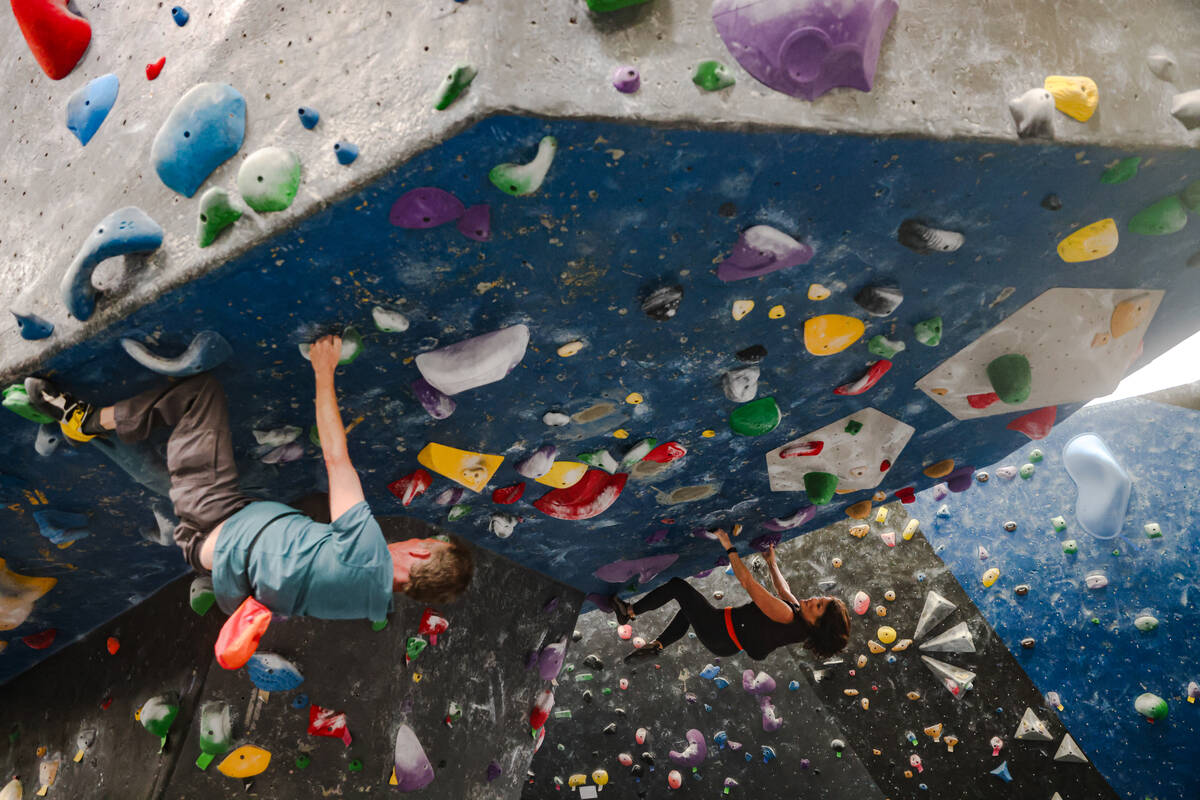‘Free Solo’ climber Alex Honnold advocates for rock climbing bill

Alex Honnold often feels like an ambassador for Las Vegas and its outdoor recreation scene; the world- famous free soloist rock climber often advocates for Vegas’ “incredible” access to the wilderness when he’s on his travels.
“The proximity between giant walls and an airport in a normal city, it’s, like, unparalleled in the world,” he said. “I think that’s something that a lot of people in Vegas don’t really appreciate. People come from all over the world to appreciate this resource.”
On Wednesday, Honnold, the Las Vegas resident featured in the documentary “Free Solo,” for his climb of Yosemite National Park’s massive El Capitan rock wall without ropes or other artifical support, also advocated for federal legislation that aims to increase access to the outdoors.
He joined Democratic Rep. Susie Lee in a panel discussion with local outdoor recreation small businesses and the Nevada Outdoor Business Coalition to talk about ways to support outdoor recreation, challenges the community faces and legislative efforts to improve access to the wilderness.
Increasing access
Lee highlighted the EXPLORE Act, a bipartisan outdoor recreation package that recently passed out of the House. The package aims to increase access to outdoor recreation by reducing park overcrowding, improving accessibility for individuals with disabilities and streamlining the permitting process.
“I always feel that there’s always this tension — especially now with renewable energy coming on, which is especially big in Nevada — between preserving and enjoying” Nevada’s wilderness areas, Lee said. This package finds that balance, she said.
The legislation includes two of Lee’s bills that she co-sponsored, the Biking on Long-Distance Trails (BOLT) Act and the Protecting America’s Rock Climbing (PARC) Act. Lee is confident the package will pass the Senate soon.
The BOLT Act will provide resources to construct 10 long-distance mountain biking trails in the U.S., said Lee, who is an avid mountain biker herself. She recently fell on the trail and wore a bandage on her elbow as proof.
Making rock climbing a legit use
The PARC Act, introduced by Republican Rep. John Curtis of Utah, makes sure rock climbing is considered a legitimate use of wilderness areas. It allows for the existence and maintenance of fixed hardware on rock climbing routes, Lee said.
Honnold said some wilderness advocates have pushed to remove fixed hardware from outdoor rock walls and to make them illegal by equating them to a trail or structure. Inserting cliff bolts and rappel anchors in rock surfaces are different than building a trail or a fixed structure in the wilderness, he said.
“I’m all for protecting wilderness; I love the outdoors,” he said. “But with fixed hardware, it’s generally safer and actually greener to leave two bolts in place.”
Without the bolts and fixed anchors that are embedded into the red rocks around Red Rock National Canyon Conservation Area, for instance, climbers would end up tying ropes around trees or get into other shenanigans, he said. People wind up doing more harm to the environment, Honnold said.
Honnold himself is no stranger to the mountains in Red Rock; the free solo rock climber traversed its entire 32-mile range in one 32-hour go. He now spends most of his time climbing in Mount Charleston and Potosi Mountain.
“This is one of the few issues that all Americans basically agree on, that we want to protect the outdoors in a broad sense,” Honnold said. “But in this particular case, I think the best way to protect the outdoors is to maintain fixed hardware. People are going to be outside recreating anyway, you may as well be able to get down the safest, most efficient way.”
Challenges for outdoor recreation businesses
Lee moderated the panel, asking both the business owners and a small audience about ways to support outdoor recreation, challenges the businesses face, and outdoor initiatives they’re excited about. She asked what is missing from outdoor recreation in Nevada, and some pointed to funding and confusion over where funding is and how to apply for it.
A couple of business owners talked about concerns over conservation and sustainability.
Dolev Schreiber, owner of Basecamp Outdoor Gear in Las Vegas, said one challenge for her gear rental company, which focuses on sustainability, is ensuring that customers know what they’re doing.
“Some customers have never camped in their lives,” Schreiber said. “I have no idea if they’re actually being ethical when they’re out there.”
Schreiber’s company has a “pay-it-forward” shelf where people are encouraged to leave behind their leftover goods rather than throw it away. She wants more people to know about it and “use it so that we can make an impact” in the neighborhood.
“I always say people come to Nevada focused on the Strip and the entertainment, and so many people don’t take advantage of all the incredible outdoor opportunities we have here in Southern Nevada,” said Lee at the Refuge rock climbing gym.
Contact Jessica Hill at jehill@reviewjournal.com. Follow @jess_hillyeah on X.